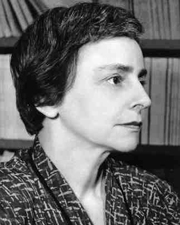Marie Syrkin
Marie Syrkin | |
|---|---|
 | |
| Born | 23 March 1899 Bern, Switzerland |
| Died | 2 February 1989 (aged 89) Santa Monica, California, US |
| Spouse(s) | |
| Signature | |
Marie Syrkin (March 23, 1899 – February 2, 1989) was an American writer, translator, educator, and Zionist activist.[1][2]
Biography
[edit]Born in Bern, Switzerland, she was the daughter of the Socialist Zionist theoretician Nachman Syrkin and his wife Bassya Syrkin (née Osnos), a feminist socialist Zionist.[1] After stays in Germany and France, and the city of Vilna, in the Russian Empire (today, Vilnius, Lithuania), the family immigrated to the United States in 1908, settling in New York City, where Marie attended public school.[1]
Syrkin's mother died of tuberculosis, at the age of 36, in 1914. When Syrkin was 18 she eloped with the 22-year-old Zionist activist Maurice Samuel; however, Nachman Syrkin intervened and had the marriage annulled.[3]
In 1918 she began studies at Cornell University, completing a bachelor's degree and going on to a master's, in English literature.[1][2] During her time at Cornell she met Aaron Bodansky, a biochemist; the couple married in 1919, and had two sons.[3] Their first child, Benya, who was born in 1921, died of whooping cough in late 1923, when Marie was pregnant with their second child, David, who was born in March 1924.[4] (David Bodansky, later became a physicist.[3]) Around that time Syrkin and her husband separated and then divorced. In 1925 she moved to New York City with her infant son David,[4] and became an English teacher at the Textile High School in Manhattan, a job she held for over two decades.[3]
In 1930, Syrkin married the poet Charles Reznikoff, whom she had first met in 1927. Sometimes living in different cities, they remained married until his death, in 1976.[3][4] In the summer of 1987 Syrkin visited Naropa Institute in Boulder, to take part in a week long conference on the Objectist Movement in American poetry of which her husband was an important member, Syrkin then in her late 80's was a lively participant, often disagreeing with Allen Ginsberg on the subject of her husband's poetry.[citation needed]
She visited Palestine for the first time in 1933.[4] In this period she also began to publish English translations of Yiddish poetry.[3] In 1934, she was a co-founder and joined the editorial staff of the New York-based Labor Zionist journal Jewish Frontier.[2][3] From this time on she regularly published articles on Jewish cultural and political life, and current issues, in the Jewish Frontier and other publications, including the New York Times and the Jerusalem Post.[3] From 1937 to 1942 she reported on the Nazi persecution of European Jewry, and advocated for the opening of Jewish immigration to British Mandate Palestine, and for the liberalization of the quota system that governed American immigration policy.[3]
Syrkin's first book, Your School, Your Children, published in 1944, was an influential study of the American school system, in which she argued that schools should actively foster democratic values.[1][2]
After the war, in 1947, she interviewed Jewish Holocaust survivors in displaced persons camps in Germany, on behalf of B'nai B'rith's Hillel program, to recruit candidates for scholarships to American universities.[1][3] She traveled to Palestine around that time as well, and conducted interviews of Holocaust survivors there; these interviews became the basis of her book Blessed Is the Match (1947), which told the story of the Warsaw Ghetto Uprising and other acts of Jewish resistance against the Nazis.[2]
She became the editor-in-chief of Jewish Frontier in 1948, and continued to lead the journal for 25 years.[2]
In 1950 Syrkin was appointed associate professor of English literature at Brandeis University, two years after it was founded; she continued teaching there until 1966, when she retired as professor emerita.[2][5] Among the courses she taught at Brandeis were courses on the literature of the Holocaust (possibly the earliest such university course), and American Jewish fiction.[3]
Works
[edit]Books[5]
- Your School, Your Children: A Teacher Looks at What's Wrong with Our Schools. New York: L. B. Fischer, 1944
- Blessed is the Match: The Story of Jewish Resistance. New York: Knopf, 1947. Reprinted, Philadelphia: Jewish Publication Society, 1976. ISBN 9780827600867
- Way of Valor: A Biography of Golda Myerson. New York: Sharon Books, 1955
- Nachman Syrkin, Socialist Zionist: A Biographical Memoir / Selected Essays. New York: Herzl Press, 1961
- Golda Meir: Woman with a Cause. New York: Putnam, 1963. Revised edition published as: Golda Meir: Israel's Leader, 1969
- Gleanings: A Diary in Verse. Santa Barbara, CA: Rhythms Press, 1979
- The State of the Jews [collection of previously published essays]. Washington, DC: New Republic Books, 1980. ISBN 9780915220601
Awards
[edit]References
[edit]- ^ a b c d e f g Kessner, Carole (2007). "Marie Syrkin". In Berenbaum, Michael; Skolnik, Fred (eds.). Encyclopaedia Judaica. Vol. 19 (2nd ed.). Detroit: Macmillan Reference. p. 398. ISBN 978-0-02-866097-4.
- ^ a b c d e f g Fowler, Glenn (February 3, 1989). "Marie Syrkin, 89; Author and Teacher Promoted Zionism." New York Times.
- ^ a b c d e f g h i j k Kessner, Carole. (March 20, 2009). "Marie Syrkin." Jewish Women: A Comprehensive Historical Encyclopedia. Jewish Women's Archive. www.jwa.org. Retrieved 2016-06-27.
- ^ a b c d Green, David B. (February 2, 2016). "This Day in History 1989: Marie Syrkin, Advocate for Israel Who Wouldn't Live Here, Dies". Haaretz. Retrieved 2017-06-28.
- ^ a b "Marie Syrkin." Contemporary Authors Online. Detroit: Gale, 2003. Retrieved via Biography in Context database 2016-06-26.
- 1899 births
- 1989 deaths
- 20th-century American writers
- American Zionists
- University of Texas at Austin faculty
- 20th-century American women writers
- Solomon Bublick Award recipients
- Writers from Bern
- Schoolteachers from New York (state)
- Swiss emigrants to the United States
- Swiss Zionists
- Brandeis University faculty
- Labor Zionists
- Zionist activists
- Cornell University alumni
- Jewish women writers
- 20th-century Swiss Jews
